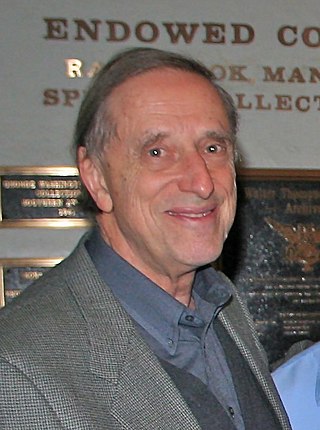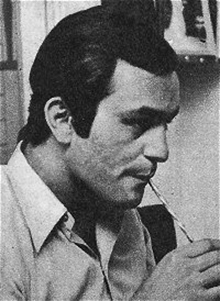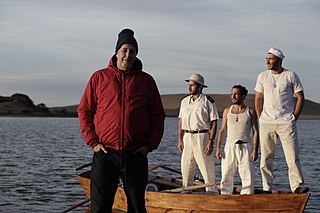
Vladimiro Ariel Dorfman is an Argentine-Chilean-American novelist, playwright, essayist, academic, and human rights activist. A citizen of the United States since 2004, he has been a professor of literature and Latin American Studies at Duke University, in Durham, North Carolina, since 1985.
Third Cinema is a Latin American film movement that started in the 1960s–70s which decries neocolonialism, the capitalist system, and the Hollywood model of cinema as mere entertainment to make money. The term was coined in the manifesto Hacia un tercer cine, written in the late 1960s by Argentine filmmakers Fernando Solanas and Octavio Getino, members of the Grupo Cine Liberación and published in 1969 in the journal Tricontinental by the OSPAAAL.
Carlos Olguin-Trelawny is a plastic artist, film director and screenwriter.

Cinema of Argentina refers to the film industry based in Argentina. The Argentine cinema comprises the art of film and creative movies made within the nation of Argentina or by Argentine filmmakers abroad.
Latin American cinema refers collectively to the film output and film industries of Latin America. Latin American film is both rich and diverse, but the main centers of production have been Argentina, Brazil and Mexico. Latin American cinema flourished after the introduction of sound, which added a linguistic barrier to the export of Hollywood film south of the border.

Lucrecia Martel is an Argentine film director, screenwriter and producer whose feature films have frequented Cannes, Venice, Berlin, Toronto, and many other international film festivals. Film scholar Paul Julian Smith wrote in 2015 that she is "arguably the most critically acclaimed auteur in Spanish-language art cinema outside Latin America" and that her "transnational auteurism and demanding features have earned her a hard-won reputation in the world art cinema festival circuit". Similarly, film scholar Haden Guest has called her "one of the most prodigiously talented filmmakers in contemporary world cinema", and film scholar David Oubiña has called her body of work a "rare perfection". In April 2018, Vogue called her "one of the greatest directors in the world right now".

Manuel Mora Morales is a Canarian writer, filmmaker and editor. He completed his studies at the University of La Laguna on the island of Tenerife. He is the president of the Asociación de Editores de Canarias.

Luis Eduardo Aute Gutiérrez was a Spanish musician, singer, composer, and film director.

The cinema of Paraguay has historically been small. However, this has begun to change in recent years with films like El Toque del Oboe (1998); María Escobar (2002); O Amigo Dunor (2005), which competed for Best Movie in the Rotterdam International Film Festival; Hamaca Paraguaya (2006), which was screened at the Cannes Film Festival, gaining critical acclaim both in Paraguay and abroad; 7 cajas (2012); Latas Vacías (2014); and Luna de Cigarras (2014).

Fuad Jorge Jury, better known by his stage name Leonardo Favio, was an Argentine singer, actor and filmmaker. He is considered one of Argentina's best film directors and one of the country's most enduring cultural figures, as well as a popular singer-songwriter throughout Latin America.

The cinema of Uruguay has a role in the culture of Uruguay and is a part of Latin American cinema. Since the late 1990s, Uruguayan cinema has undergone a process of evolution, during which its films have received positive reviews and been internationally recognized. Over 120 films, fiction and non-fiction, have been produced since then.

Leticia Dolera is a Spanish actress, screenwriter, and director. She is best known for her roles as Clara in the 2013 horror film REC 3: Genesis, Teresa in Imagining Argentina (2003), and as Carmen in the UK television series Mad Dogs.

Eduardo Makaroff is an Argentine musician, songwriter and producer. He is best known as one of the founders of Gotan Project, which has brought together the broad universe of tango with electronic music. He is currently a founding and active member of Plaza Francia Orchestra and Müller & Makaroff, both with long time collaborator Christoph H. Müller.

Jorge Ricardo Preloran was an Argentine filmmaker and a pioneer in ethnobiographic film making.

Ricardo Preve is an Argentine filmmaker, photographer, and activist. Preve began his film career in the early 2000s as an associate producer on some documentaries. Since then, he has worked as a director, producer or scriptwriter in nearly thirty productions for film and television, including The Patagonian Bones (2015), Coming Home (2019), From Sudan to Argentina (2022) and Sometime, Somewhere (2023), which have won awards and recognition at international festivals. Preve is the owner of the audiovisual production companies Ricardo Preve Films LLC and Esto del Cine SRL.

Lucía Puenzo is an Argentine author, screenwriter and film director. She is the daughter of the Oscar-winning film director, producer, and screenplay writer, Luis Puenzo.
Buenos Aires Rojo Sangre (BARS) is an international film festival devoted to the genres of science fiction, horror and fantasy. It began in 2000 with a focus on independent films in those genres, and since 2004 in the form of a competitive festival, Buenos Aires Rojo Sangre is well attended with over 200 films shown and 12.000 public and industry admissions each year. BARS is declared of national interest by the National Institute of Cinema and Audiovisual Arts, sponsored by the Film Museum of the City of Buenos Aires and declared of cultural interest by the legislature of the autonomous city of Buenos Aires.
The Biarritz Festival Latin America is an international film festival held annually in the French city of Biarritz, since 1979 to promote the Latin American cinema and culture with the French people and offer opportunities to distribution or coproductions to Latin American films.

Pablo César is an Argentine film director, film producer, screenwriter and film professor. He began his filmmaking career in the Buenos Aires independent short film scene shot in the Super 8 format, making more than twenty works between the 1970s and 1980s, among which Del génesis (1980), Ecce civitas nostra (1984)—co-directed with Jorge Polaco—and Memorias de un loco (1985) stand out. In 1983, César directed his first feature film De las caras del espejo, shot in Super-8. He turned to the 35 mm film format from his second feature onwards, La sagrada familia (1988), an ironic film that works as a critique of the abuse of power, as well as an allegory of the era of the last civic-military dictatorship in Argentina.
Estefanía de los Santos is a Spanish actress who has participated in several national fiction and feature films such as Bienvenidos al Lolita, Perdóname, Señor, El Continental or La peste. In 2012 she was nominated for a Goya Award for her performance in the feature film Grupo 7.














